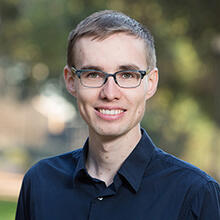“Noise-Induced Randomization in Regression Discontinuity Designs,” Stefan Wager, Stanford GSB

QUANTITATIVE RESEARCH METHODS WORKSHOP
Abstract: Regression discontinuity designs are used to estimate causal effects in settings where treatment is determined by whether an observed running variable crosses a pre-specified threshold. While the resulting sampling design is sometimes described as akin to a locally randomized experiment in a neighborhood of the threshold, standard formal analyses do not make reference to probabilistic treatment assignment and instead identify treatment effects via continuity arguments. Here we propose a new approach to identification, estimation, and inference in regression discontinuity designs that exploits measurement error in the running variable. Under an assumption that the measurement error is exogenous, we show how to consistently estimate causal effects using a class of linear estimators that weight treated and control units so as to balance a latent variable of which the running variable is a noisy measure. We find this approach to facilitate identification of both familiar estimands from the literature, as well as policy-relevant estimands that correspond to the effects of realistic changes to the existing treatment assignment rule. We demonstrate the method with a study of retention of HIV patients and evaluate its performance using simulated data and a regression discontinuity design artificially constructed from test scores in early childhood.
Stefan Wager is an associate professor of Operations, Information, and Technology at the Stanford Graduate School of Business, and an associate professor of Statistics (by courtesy). His research lies at the intersection of causal inference, optimization, and statistical learning. He is particularly interested in developing new solutions to problems in statistics, economics and decision making that leverage recent advances in machine learning.
This workshop is open to the Yale community only and will be held in a hybrid format. Current Yale faculty, students, and staff are encouraged to attend in person. Participants will also be able to attend remotely on Zoom. To receive announcements and invitations to attend either in person or remotely, please subscribe at https://csap.yale.edu/quantitative-research-methods-workshop.
The series is sponsored by the ISPS Center for the Study of American Politics and The Whitney and Betty MacMillan Center for International and Area Studies at Yale with support from the Edward J. and Dorothy Clarke Kempf Fund.